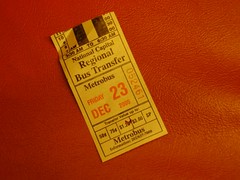Transit cuts and fare hikes in the DC region
I have been remiss in not writing very much about WMATA's move to an all-digital transfer system based on Smart Cards, effective January 5th. Yes, as the City Paper points out in "The passing of paper Metrobus transfers in D.C. marks the end of a great fraud," it will reduce if not eliminate most ways to game the system by selling or giving transfers away, finding one on the street, or by benefitting (I've done it many times) from transfers with more than a 2.5 hour time window.
It will speed up the system which is good. It will generate more income, as will the "increase" in the price of a transfer for most trips other than bus to bus. Now a subway to bus transfer will cost 75 cents instead of 35 cents, which will likely generate more revenue than lost by giving a 50 cent discount to bus riders transferring to rail.
I do worry about the limited number of places to add money to Smart Cards. And I think there should have been a longer period before the actual launch (maybe into March). But this will pass.
2. Most every transit system in the U.S. is facing massive budget deficits due to various reductions in revenue streams and increased costs for fuel and personnel. It's why I don't push hard against reasonable fare hikes. Sadly, the Washington Examiner reports, in "Metro warns of ‘grim budget forecast’" that transit service cuts are likely here too.
DC messed up by not increasing bus fares in the last fare increase (they should have gone up to $1.50) and maybe even the base Metro subway fare, as much as I don't like it.
There are likely to be unwelcome service cuts in bus service for sure, and maybe the subway. Even junking stupid services like the N22, which are designed to placate business constituencies but don't serve a clear need, won't be enough to financially right the revenue-cost balance.
3. To better develop a stable funding stream for transit in the DC region, it's time to take up the idea of a payroll tax, just as the MTA in New York has suggested. While I think a goodly amount of such funding should be directed to system expansion, of course, this funding should be used to fund operations as well. But the ratio of spending between expansion and improvement vs. operations needs to be fixed, rather than be treated variably according to the whims of the region's politicos.
--------
From week to week, because of the blog I get emails from people in the region and beyond asking me questions. I am still a little peeved about the reply I made to someone asking for advice on how to fight transit fare hikes. S/he stayed mute in response to what I wrote, which did call for looking at transfer policies which favored long trips by suburban commuters at the expense of shorter trips by inner city folks, but that it's not that easy to fight fare hikes in the face of increasing costs and limited revenues.
S/he did direct me to an interesting story about the Rochester New York transit system, and how it has developed institutional funding streams related to fee for service, but at fees greater than the fare cost, pegged to total costs.
See "Creativity Helps Rochester’s Transit System Turn a Profit" from the New York Times. The thing about this is that you can't build that kind of revenue stream over night, especially during financial crisis--it takes years of developing solid relationships with various institutions.
Labels: transit fares, transit funding




1 Comments:
That is really interesting!
Payroll Company in Johannesburg
Post a Comment
<< Home